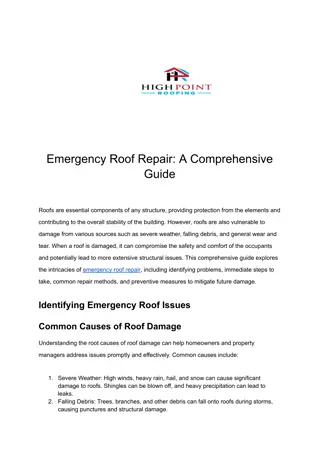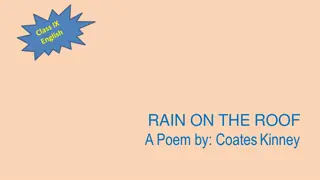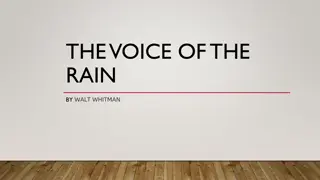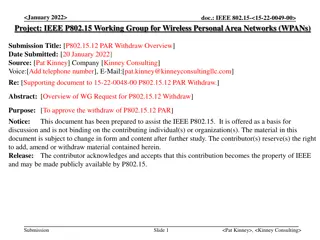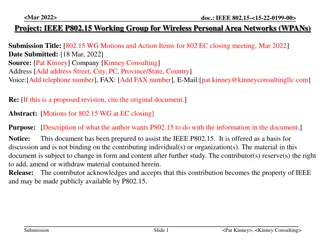Analysis of "Rain on the Roof" Poem by Coates Kinney
The analysis of Coates Kinney's poem "Rain on the Roof" delves into the poet's emotional connection with the sound of raindrops falling on his roof, evoking memories of his mother and the healing power of rain. The poem explores themes of nostalgia, comfort, and the ability of rain to transport the mind to a peaceful past, highlighting the profound impact of nature on our emotions and memories.
Download Presentation

Please find below an Image/Link to download the presentation.
The content on the website is provided AS IS for your information and personal use only. It may not be sold, licensed, or shared on other websites without obtaining consent from the author. Download presentation by click this link. If you encounter any issues during the download, it is possible that the publisher has removed the file from their server.
E N D
Presentation Transcript
RAIN ON THE ROOF A Poem by: CoatesKinney
About the Poet Coates Kinney: (November 24, 1826 - January 25, 1904) was a lawyer, politician, journalist, and poet from the United States.
What is the meaning of the poem rain on the roof? The poem 'Rain on the Roof' talks about the poet's varied reactions to the sound of raindrops falling on the roof of his house. He says that the sound of rain drops helps him fall asleep and gives him sweet dreams. He has memories of his loving mother who would put them to sleep.
Theme The theme of the poem is the healing power of rain. The musical sound of raindrops falling on the rooftop at night has the ability to revive sweet memories and rouse fancies in an otherwise busy mind. The rain thus soothes and comforts an overworked mind by taking it back to its lovely past.
Why is the poet affected by the rain? Every drop of rain falling on the roof makes a tinkling sound that moves the poet's heart. As the poet listens to the music made by the rain falling on the roof, he visualizes in his mind the affectionate look of his mother. Thus, the rain makes a bridge between his present and his past.
Rain on the Roof The Poem .
When the humid shadows hover (repetition of h sound). Overall the starry spheres (repetition of s sound). Press the pillow (repetition p sound). Cottage chamber bed (repetition c sound). Lie listening (repetition l sound).
Rain on the Roof Stanza-wise descriptions . In the first stanza, the poet describes a rainy night. He says that all the stars of the sky have become invisible because they have been covered by clouds. Darkness usually has a negative connotation, and the poet makes no exception to this rule. He says that the darkness is making him sad and reflective, and the rain also seems to mirror his emotions as it looks like tears falling softly from human eyes.
Rain on the Roof At this point, the only thing that can bring joy to the poet is to curl up with a pillow in the bed of a country cottage. Though the rooms of the cottage may be small and ill- equipped, the sound of raindrops can only transport him there for him to recover from his melancholic mood.
Rain on the Roof In the second stanza, the poet describes how the raindrops make the loudest sound as they fall on the shingles of the roof. Each sound that is made by the rain in this way is repeated the next instant by the beating of his heart. The things he has only been imagining now start to appear before his very eyes.
Rain on the Roof As he is listening to the soft and continuous falling of the raindrops on his roof, all his memories are coming back to him, but they are not discrete and separated from each other. Instead all of his memories seem to have formed a patchwork by becoming entwined with one another.
Rain on the Roof In the third stanza, the poet describes the first memory that he can actually identify among the patchwork that all his memories have formed by remembers how many years ago, in his childhood, his mother used to look down at him and his siblings as they were sleeping and having pleasant dreams. meshing together. He
Rain on the Roof His mother would make a point to look at them every night, for she knew she would not see them again till the next morning. What the poet remembers more than anything is how his mother would bend down and watch over him in particular. These memories are evoked as he listens to the repetitive rhythm of the raindrops as they are falling on his roof.
Rain on the Roof The End






